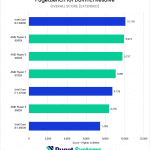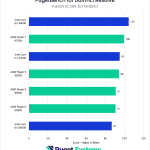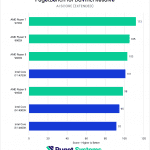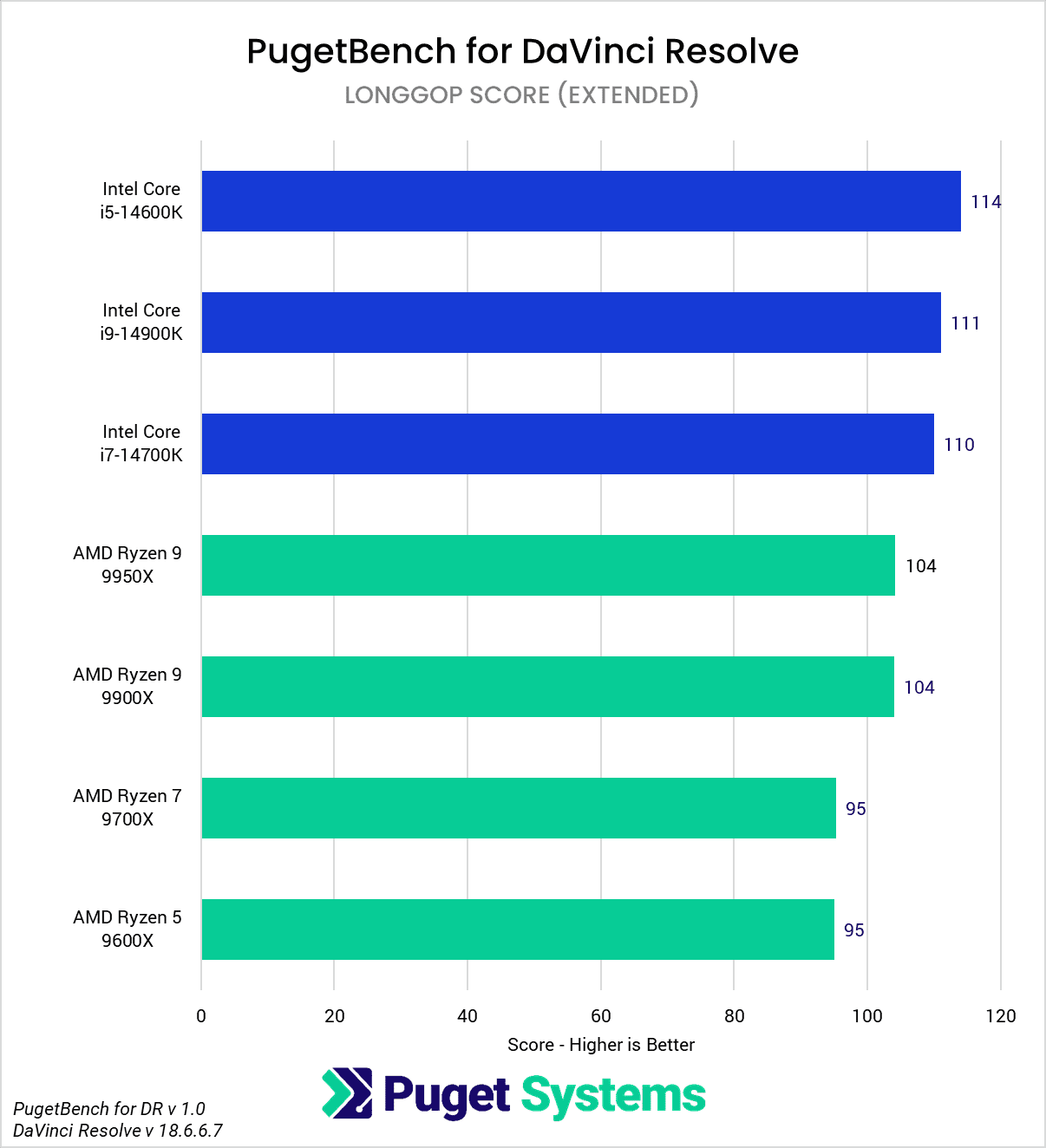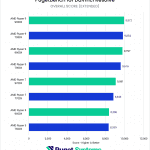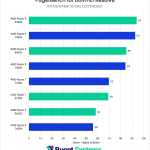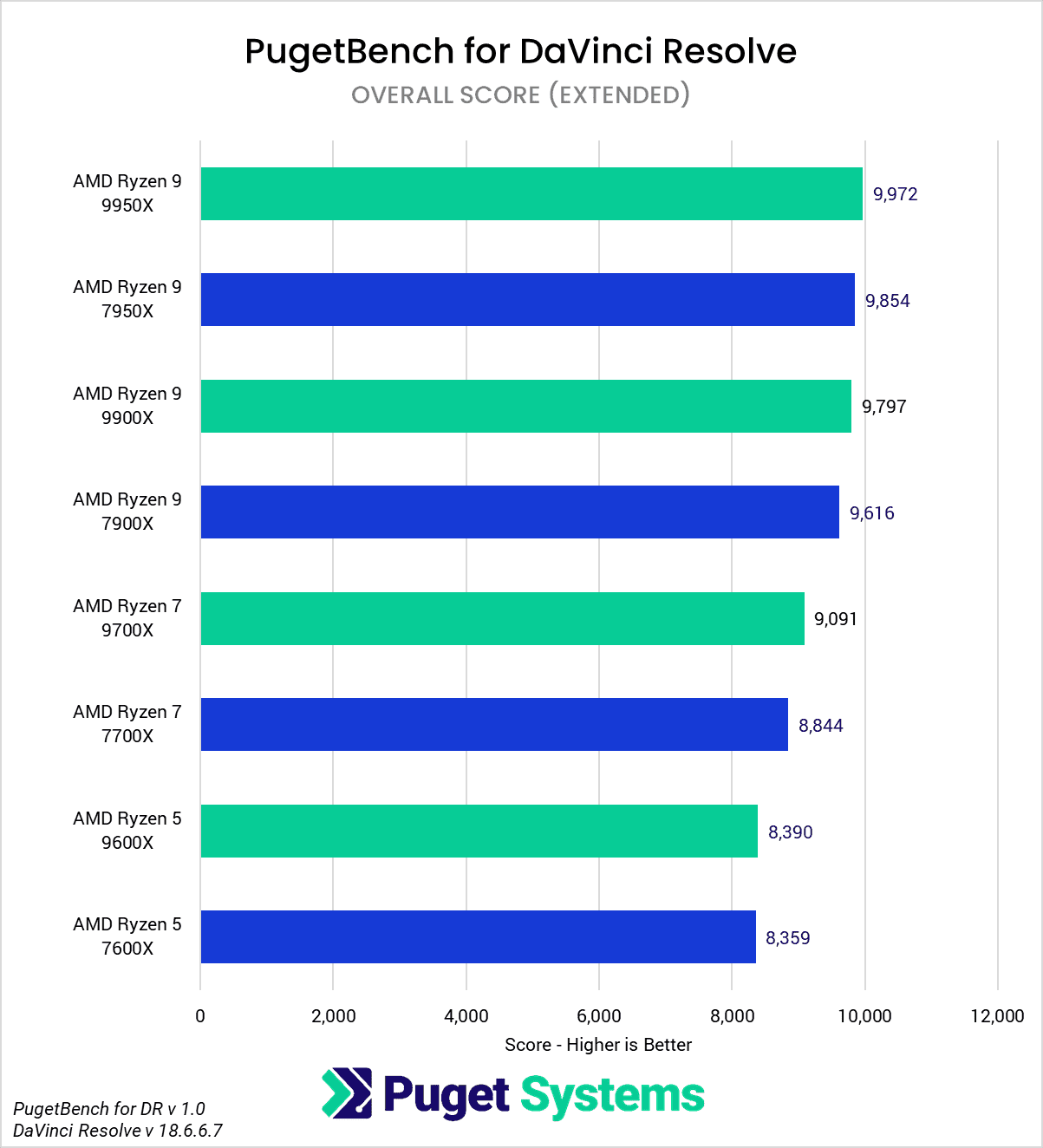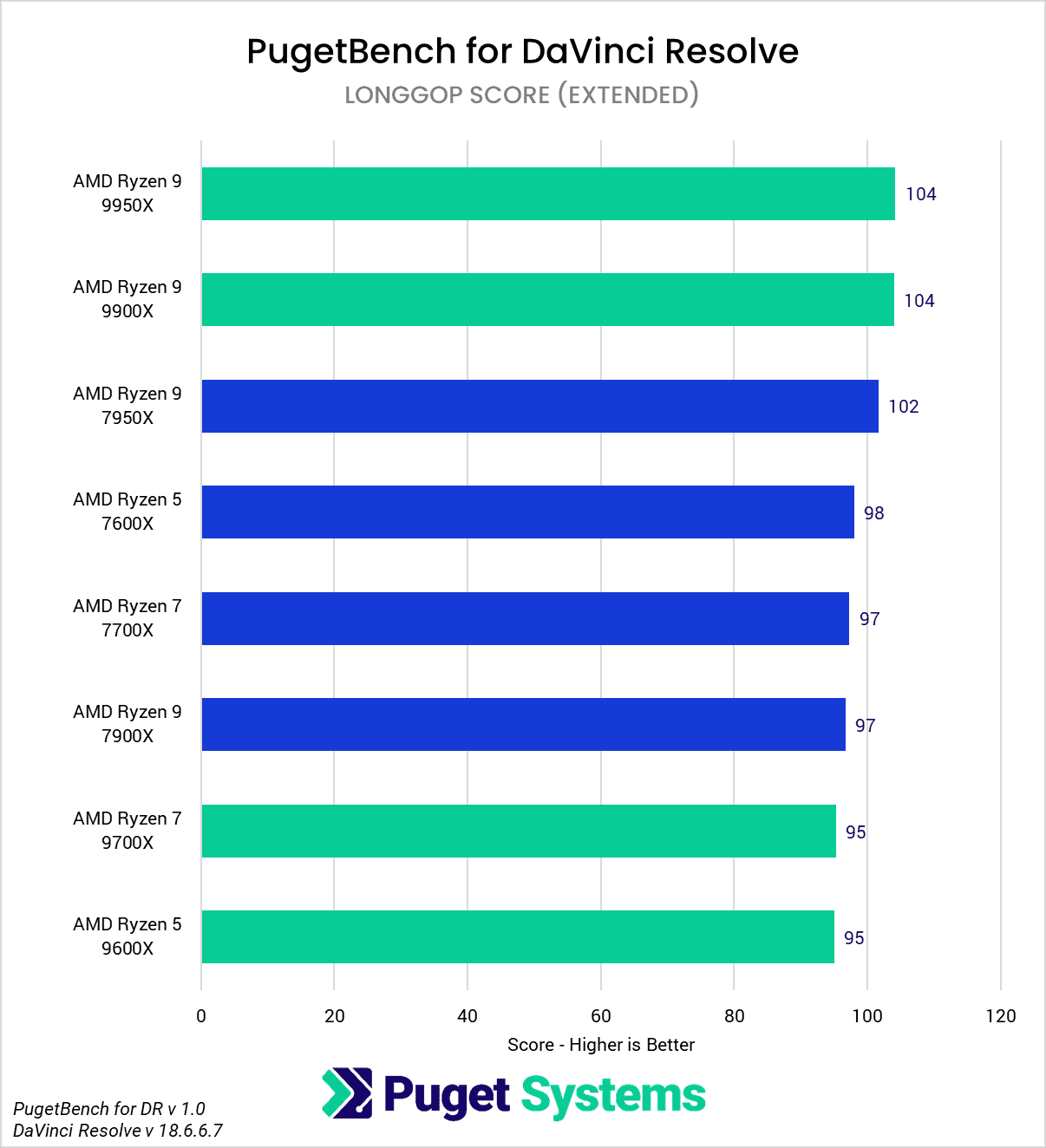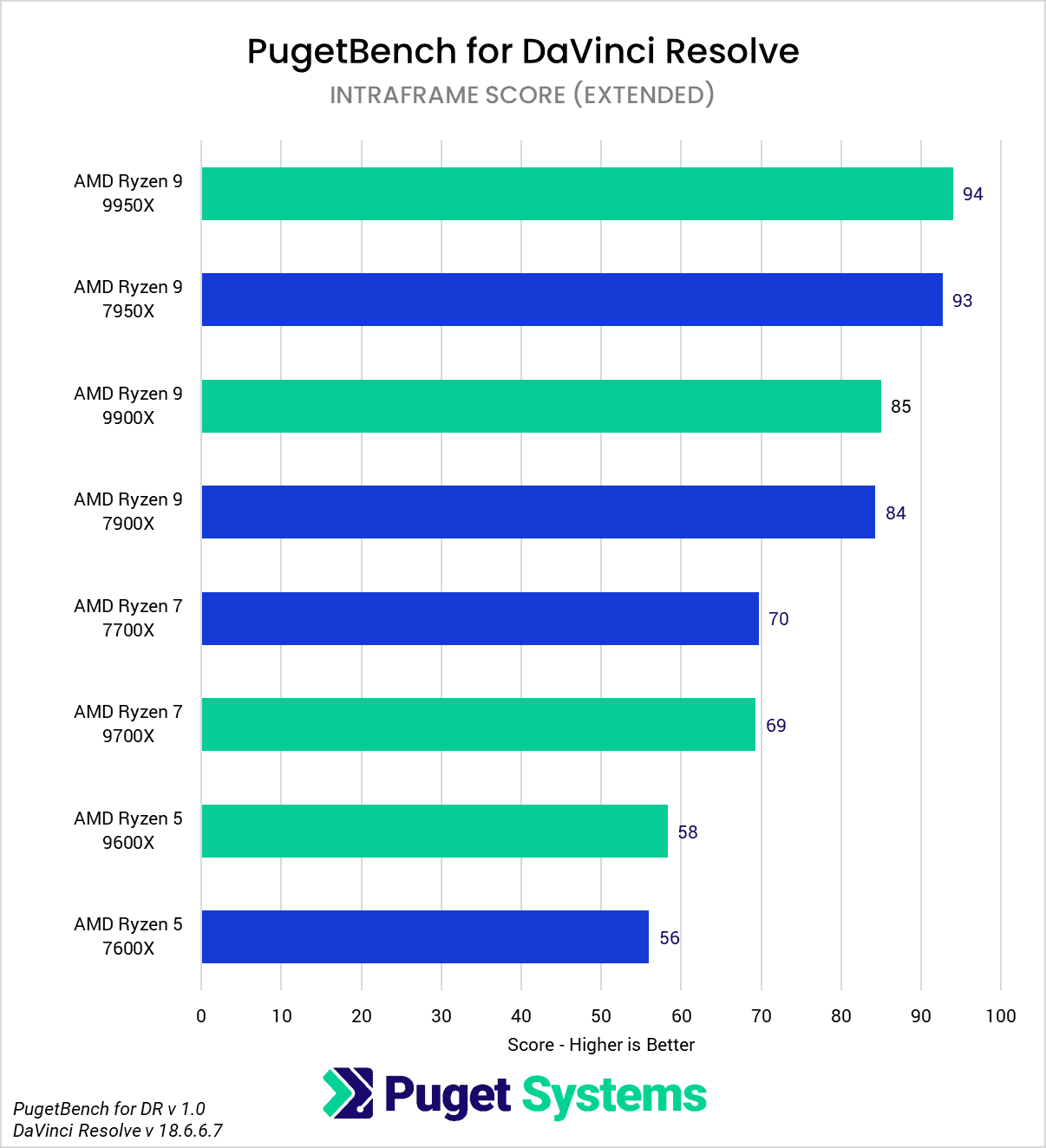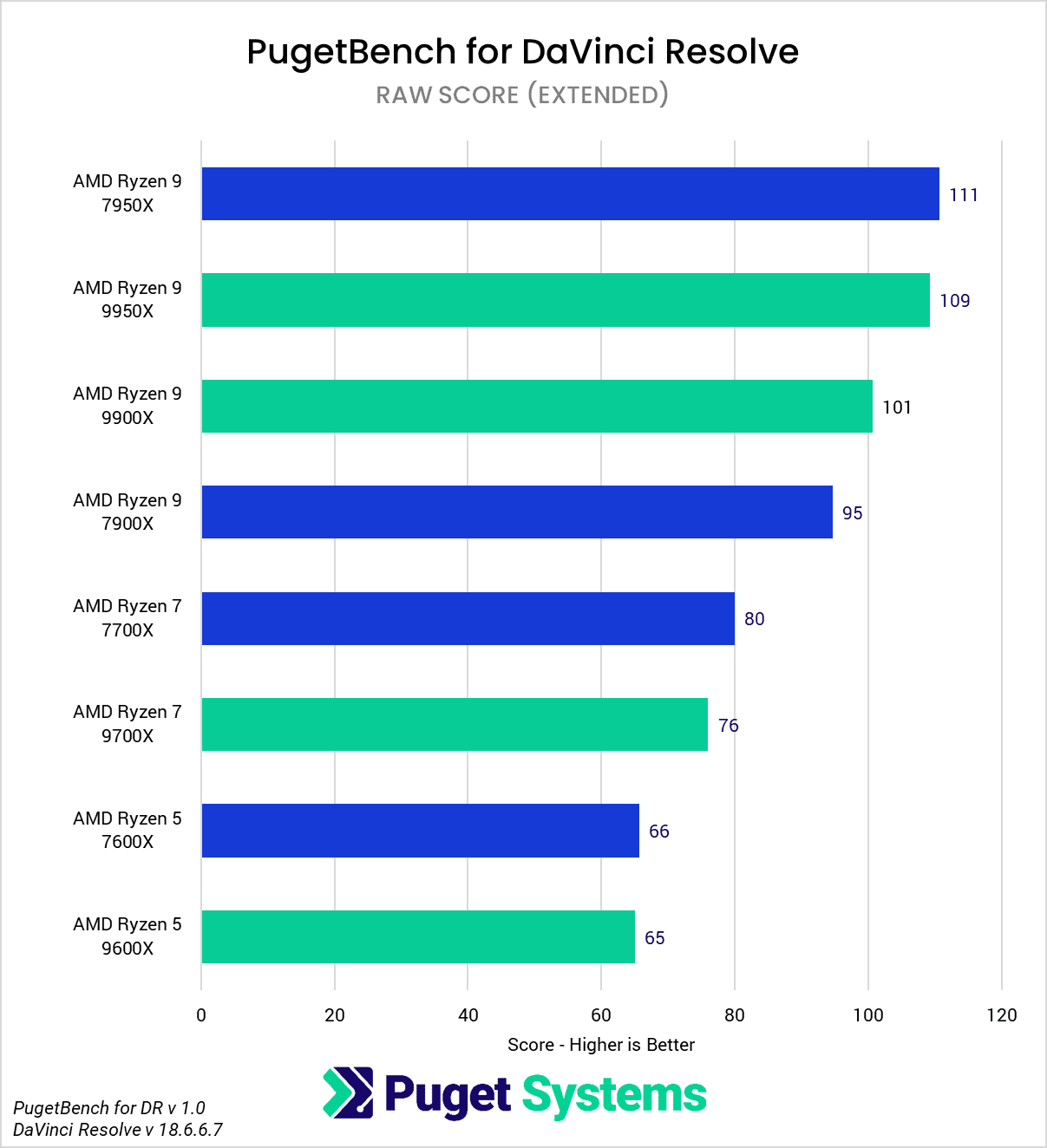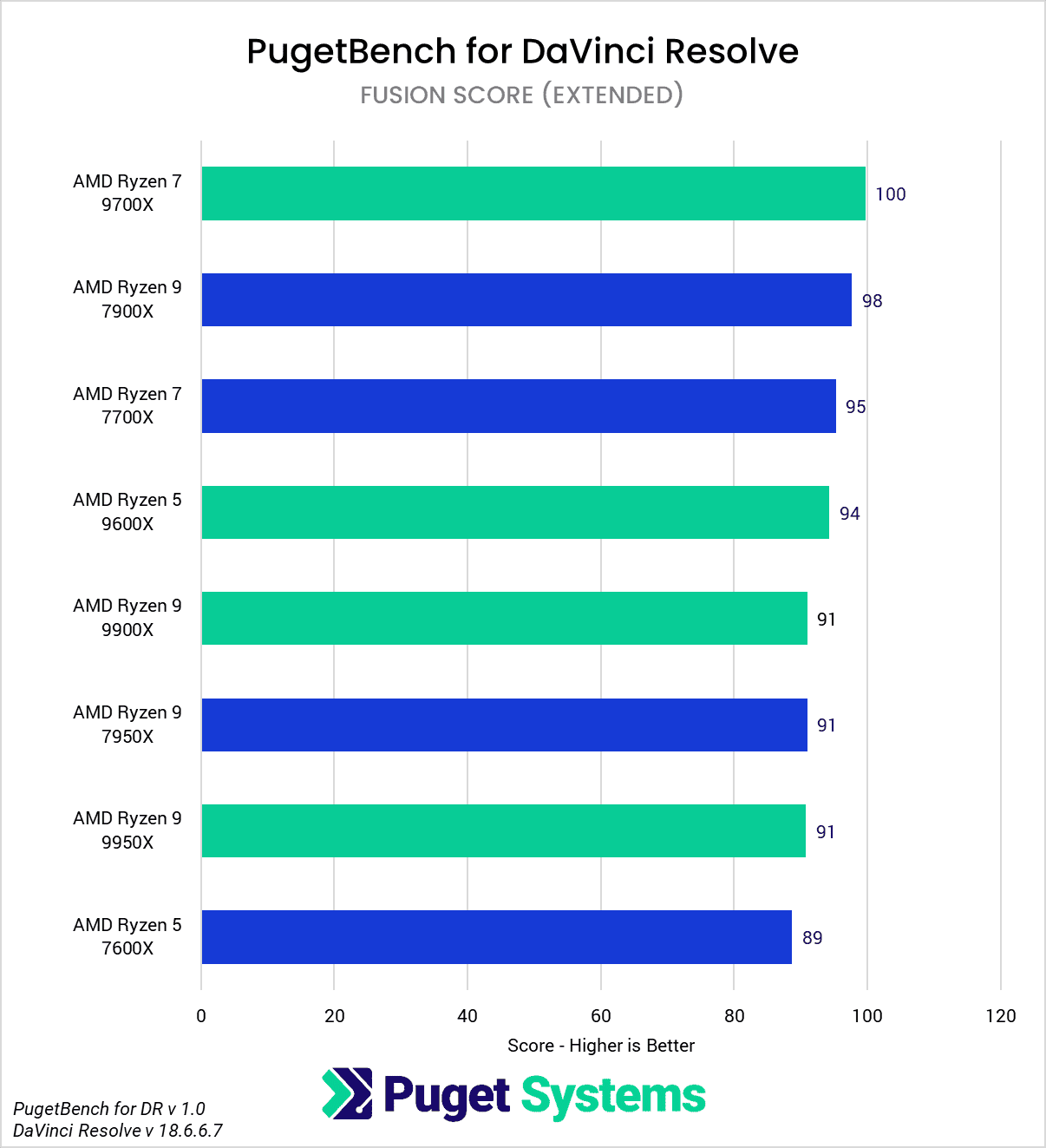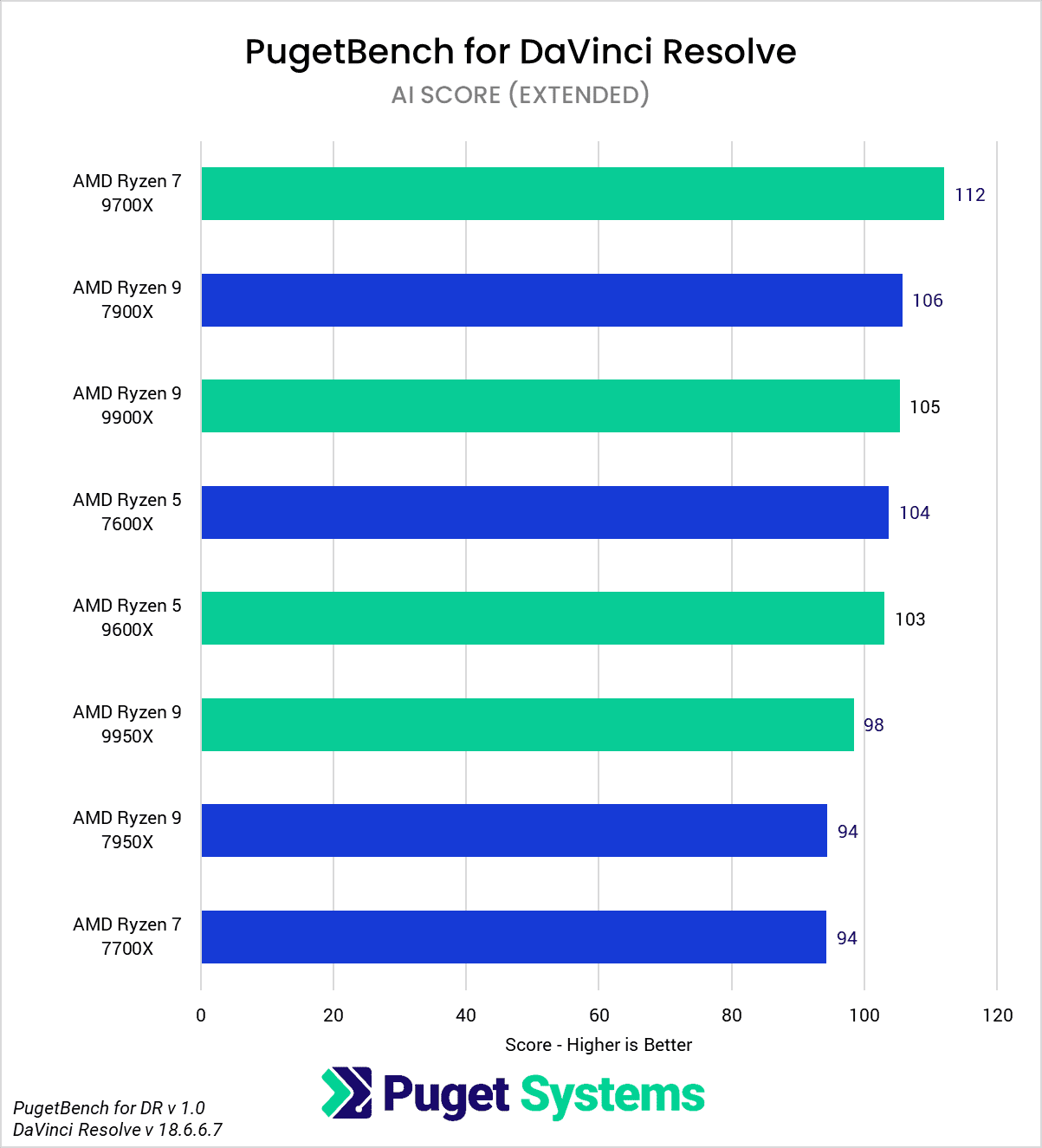Table of Contents
TL;DR: AMD Ryzen 9000 Series Processor Performance in DaVinci Resolve Studio
Overall, AMD’s new Ryzen 9000 Series Processors do fine in DaVinci Resolve Studio, but they are not significantly faster than the previous generation’s Ryzen 7000 CPUs. Despite this, AMD does have a decent lead at the Ryzen 5/7 level, with the Ryzen 5 9600X and Ryzen 7 9700X scoring about 5-10% higher than Intel. In fact, AMD is faster almost across the board, with the only significant exception being HEVC 4:2:2 10-bit media where the Core i5 14600K and i7 14700K can be more than 2x the performance of AMD.
At the high end, Intel and AMD are more on par, but most users will likely choose the Intel Core i9 14900K. Intel is faster in general, consistently scoring 10-20% higher in most of our tests. However, the Ryzen 9 9950X is 12% faster for RAW codecs, and both Ryzen 9 CPUs are a bit faster for the AI-based workloads in Resolve.
Introduction
AMD recently launched its new Ryzen 9000 Series processors, which are a fairly minor refresh to its existing Ryzen 7000 processors. Utilizing the same AM5 socket and compatible with existing X670 motherboards, Ryzen 9000 is based on AMD’s new Zen 5 CPU architecture, which promises increased IPC (Instructions Per Clock), improved efficiency, and better memory support.
In this article, we will examine how these new processors perform specifically in Blackmagic DaVinci Resolve Studio. Before going too far, we do want to point out that this is the first detailed CPU testing with the latest “1.0” version of our PugetBench for DaVinci Resolve benchmark. This new version features a completely overhauled test suite with a greatly expanded set of codecs and GPU-based OpenFX tests. In addition, based on the work BlackMagic has been doing to integrate AI into DaVinci Resolve, we added a whole suite of tests looking at the various AI features in Resolve, including Super Scale, Face Refinement, Magic Mask, Video Stabilization, Smart Reframe, and more!
Between the new AMD Ryzen 9000 CPUs and the updates to our benchmarks, we are very curious to see how AMD and Intel compare in DaVinci Resolve Studio compared to the previous testing done in our DaVinci Resolve Studio: Intel Core 14th Gen vs AMD Ryzen 7000 article. In the past, Intel has held a small lead, but the difference was small enough that almost any gen-over-gen performance gains from AMD should close the gap.
Because we will be examining so many CPUs, we will divide our analysis into Intel vs. AMD (AMD Ryzen 9000 vs. Intel Core 14th Gen) and performance versus the previous generation (AMD Ryzen 9000 vs. AMD Ryzen 7000).
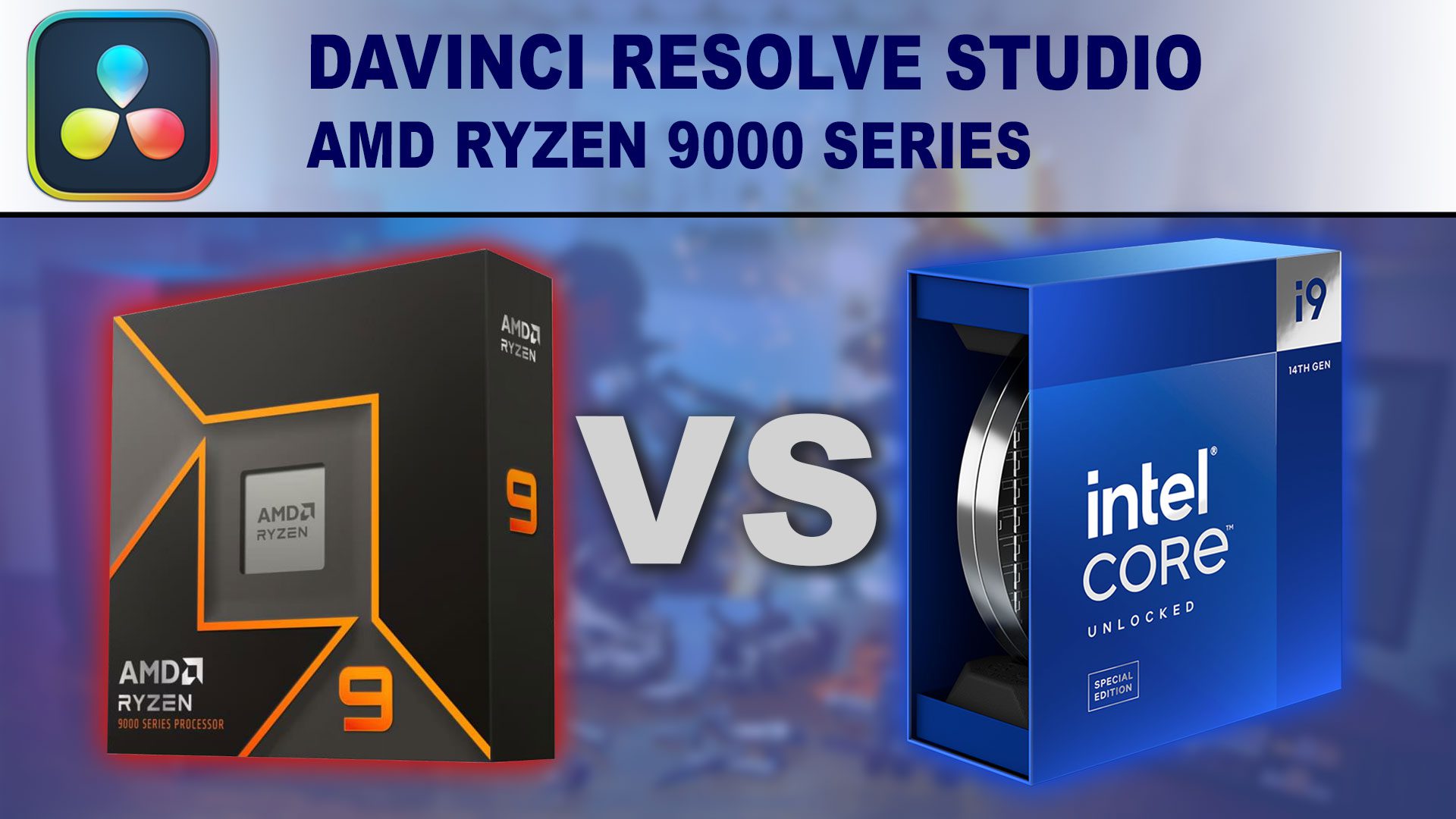
If you want to read more about the new AMD Ryzen 9000 CPUs and what separates them from the previous generation, we recommend checking out our main AMD Ryzen 9000 Series Content Creation Review article. That post includes more detailed information on the CPU specifications, MSRP, and an overview of testing results for a range of other applications, including Premiere Pro, DaVinci Resolve, After Effects, Unreal Engine, Cinema 4D, Blender, and V-Ray.
Raw Benchmark Data
We design our benchmarks to cover many workflows and tasks to provide a balanced look at the application and its hardware interactions. However, many users have more specialized workflows. Recognizing this, we like to provide individual results for benchmarks as well. If a specific area comprises most of your work, examining those results will give a more accurate understanding of the performance disparities between components.

AMD Ryzen 9000 vs Intel Core 14th Gen for DaVinci Resolve Studio
If you look at our previous consumer-level DaVinci Resolve CPU article (DaVinci Resolve Studio: Intel Core 14th Gen vs AMD Ryzen 7000), the AMD vs Intel story is a little different this time around. However, most of the change appears to be from the updates we made in our benchmark to bring it up to speed with modern workflows in DaVinci Resolve. Interestingly, there wasn’t much of a performance improvement with the new Ryzen 9000 CPUs compared to the previous generation, although we will get more into that in the next section.
Comparing Intel and AMD CPU models directly is a bit tough since they do not carry matching MSRP. The closest matches are:
- AMD Ryzen 9 9950X ($650) vs. Intel Core i9 14900K ($590)
- AMD Ryzen 9 9900X ($500) vs. Intel Core i9 14900K ($590)
- AMD Ryzen 7 9700X ($360) vs. Intel Core i7 14700K ($410)
- AMD Ryzen 5 9600X ($280) vs. Intel Core i5 14600K ($320)
We do want to point out that in these comparisons, AMD is a bit less expensive than Intel in terms of price, other than the 9950X vs 14900K. They also have a lower power draw, meaning less heat output and noise. Because of that, if things are close, AMD actually has the advantage.
Starting at the bottom of the stack, the AMD Ryzen 5 9600X performs well compared to the Intel Core i5 14600K, with about a 10% performance lead. However, the 14600K is faster in some workloads, namely when working with LongGOP codecs like H.264 and HEVC where the 14600K is 20% faster than the 9600X. The 9600X is impressively faster for intraframe codecs like ProRes and DNx, as well as for RAW codecs like RED, but it is rare that anyone will be considering a Ryzen 5 or Core i5 CPU for that type of workflow. Because of this, the majority of users looking for a CPU at this budget level may actually be better off with the Core i5 14600K even though the 9600X scored higher in our benchmark overall.
Moving up a step to the Ryzen 7 9700X, Intel takes a small overall lead with the Core i7 14700K scoring about 4% higher overall. Once again, working with LongGOP is Intel’s strength, and for that, the 14700K is 15% faster than AMD. It is worth pointing out that Intel’s lead here (and with all the Intel Core CPU models) is almost entirely when working with HEVC 4:2:2 10-bit media, for which only Intel has hardware decoding support. The 14700K is more than 2x as fast as the 9700X for this specific type of codec, but AMD and Intel are basically on par for the other types of H.264/HEVC codecs we test. On the other hand, the Ryzen 7 9700X is about 10% faster than Intel when working with intraframe and RAW codecs, as well as with the new AI-based features.
Going up to the Ryzen 9 models, the Intel Core i9 14900K scored about the same overall as both the Ryzen 9 9900X and 9950X. However, like the other CPU comparisons, the faster processor comes down to the specific workload you are looking at. Intel is actually faster in general (including for Intraframe codecs this time around), although the 9950X is faster for RAW codecs, and both Ryzen 9 CPUs are faster for the AI-based features in Resolve.
Overall, choosing between AMD Ryzen 9000 and Intel Core 14th Gen for DaVinci Resolve Studio comes down to your budget and workflow. At the ~$400 MSRP level and below, AMD has the performance advantage almost everywhere except when working with HEVC 4:2:2 10-bit media. On the other hand, the Intel Core i9 14900K is faster in most cases than the 9900X, and the 9950X only has a decent advantage with RAW media.
AMD Ryzen 9000 vs AMD Ryzen 7000 for DaVinci Resolve Studio
When comparing the new AMD Ryzen 9000 Series to the previous Ryzen 7000 Series, be aware that AMD technically introduced a small price drop with the new CPUs. However, since AMD CPUs are often on sale, the new models will actually be a bit more expensive in most cases. That should even out over time as the Ryzen 9000 CPUs eventually go on sale, but for now, Ryzen 9000 will likely have a small price premium over the older 7000 models.
Rather than going through each model one by one, we are simply going to state that the gen-over-gen performance uplift is incredibly minor in DaVinci Resolve Studio. Some specific tests showed a greater improvement, but overall, the difference between Ryzen 7000 and Ryzen 9000 is within the margin of error for this type of real-world testing (about 3-5%).
How Well Do the AMD Ryzen 9000 CPUs Perform in DaVinci Resolve Studio?
Overall, AMD’s new Ryzen 9000 Series Processors do fine in DaVinci Resolve Studio, but they are not significantly faster than the previous generation’s Ryzen 7000 CPUs. Our conclusions are a bit different this time around compared to previous testing we have done, but that is largely due to changes in our DaVinci Resolve benchmark rather than any gen-over-gen improvements made by AMD.
While there certainly is no reason to upgrade an existing Ryzen 7000 system to one of the new 9000 CPUs, there is still the question of whether you should go with AMD Ryzen or Intel Core if you are purchasing a new system. Unfortunately, unlike many of our other Ryzen 9000 articles, the answer is a bit more complex for DaVinci Resolve. It changes depending on exactly what CPU you are looking at, and what your workflow is.
Starting at the lower end, AMD has a pretty sizable advantage over Intel with both the Ryzen 5 9600X and Ryzen 7 9700X. In both cases, AMD is around 10-20% faster when working with RAW and intraframe codecs, as well as when using the newer AI-based features in Resolve. They are also on par with most longGOP (H.264/HEVC) codecs with the exception being HEVC 4:2:2 10-bit, which only Intel has hardware decoding support for. For that specific codec, Intel is often more than 2x the performance of AMD.
At the high end, however, Intel and AMD are more on par, but we would give the Core i9 14900K the win for most users. Intel is faster in general, although the 9950X is faster for RAW codecs, and both Ryzen 9 CPUs are faster for the AI-based workloads in Resolve. Getting the best performance for the new AI features isn’t something that seems to be a priority for most quite yet, so unless you plan on working with a lot of RAW media and are willing to invest in the Ryzen 9 9950X, the Core i9 14900K is probably the better pick.
Every application uniquely utilizes hardware, so our results here don’t necessarily translate to any other application. Our focus in this article centers specifically on AMD Ryzen 9000 Series performance in DaVinci Resolve Studio. However, we recommend checking out our AMD Ryzen 9000 Series Content Creation Review article, which includes a broad overview of results for several different applications. If you use other software packages, it also has links to our in-depth testing articles for content creation: Photoshop, Premiere Pro, After Effects, Unreal Engine, Cinema 4D, Blender, and V-Ray.
Finding the perfect workstation doesn’t have to be complicated. Explore our solutions page for a curated selection of recommended systems for a multitude of applications and workflows, or visit our custom configuration page if you already know the ideal hardware for your needs. If you need assistance with tailoring a system to a unique workflow or have any other questions, we encourage you to reach out to our dedicated technology consultants.


